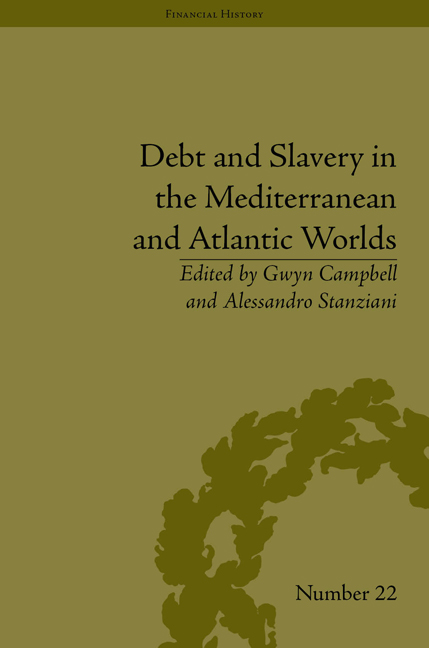Book contents
- Frontmatter
- Contents
- Acknowledgements
- List of Contributors
- Introduction
- 1 Debt Bondage and Chattel Slavery in Early Rome
- 2 Slavery, Debt and Bondage: The Mediterranean and the Eurasia Connection from the Fifteenth to the Eighteenth Century
- 3 Clientship, Social Indebtedness and State-Controlled Emancipation of Africans in the Late Ottoman Empire
- 4 Pawnship and Seizure for Debt in the Process of Enslavement in West Africa
- 5 The Business of ‘Trust’ and the Enslavement of Yoruba Women and Children for Debt
- 6 The Africanization of the Workforce in English America
- 7 Credit, Captives, Collateral and Currencies: Debt, Slavery and the Financing of the Atlantic World
- 8 Unpayable Debts: Reinventing Bonded Labour through Legal Freedom in Nineteenth-Century Brazil
- 9 Indigenous Debt and the Spirit of Colonial Capitalism: Debt, Taxes and the Cash-Crop Economy in the Anglo-Egyptian Sudan, 1898–1956
- Notes
- Index
5 - The Business of ‘Trust’ and the Enslavement of Yoruba Women and Children for Debt
- Frontmatter
- Contents
- Acknowledgements
- List of Contributors
- Introduction
- 1 Debt Bondage and Chattel Slavery in Early Rome
- 2 Slavery, Debt and Bondage: The Mediterranean and the Eurasia Connection from the Fifteenth to the Eighteenth Century
- 3 Clientship, Social Indebtedness and State-Controlled Emancipation of Africans in the Late Ottoman Empire
- 4 Pawnship and Seizure for Debt in the Process of Enslavement in West Africa
- 5 The Business of ‘Trust’ and the Enslavement of Yoruba Women and Children for Debt
- 6 The Africanization of the Workforce in English America
- 7 Credit, Captives, Collateral and Currencies: Debt, Slavery and the Financing of the Atlantic World
- 8 Unpayable Debts: Reinventing Bonded Labour through Legal Freedom in Nineteenth-Century Brazil
- 9 Indigenous Debt and the Spirit of Colonial Capitalism: Debt, Taxes and the Cash-Crop Economy in the Anglo-Egyptian Sudan, 1898–1956
- Notes
- Index
Summary
Slave-wives have been sometimes sold off with their babies born to their masters to pay debts.
James Johnson, Ibadan, April 1877In his journal of 16 April 1864, James Thomas, the agent of the Church Missionary Society (CMS) at Gbebe, a town in the north-eastern Yoruba district of Bunu, near the confluence of River Niger, reported that his congregation paid eight bags of cowries for the redemption of a woman and her son to prevent their enslavement for debt. The woman, Elizabeth Alady, was seized during a Nupe raid on an unnamed Yoruba town around 1850 and later taken as a slave wife. In 1864, three years after she gave birth to a son, the master-husband and his freeborn wife were convicted of a crime and ordered to pay the value of two prime slaves in fine. This was an exorbitant fine for the poor couple. Because they had no means of paying what amounted to debt, the court seized Alady and her son and sold them into slavery in order to pay their debt. However, the local CMS redeemed mother and child before the buyer could take them away. This case illustrates an interface between debt and the enslavement of women and children in Yorubaland. Although most accounts of enslavement tactics in nineteenth-century Yorubaland have focused on warfare and kidnapping, many women and children were enslaved for debt.
- Type
- Chapter
- Information
- Publisher: Pickering & ChattoFirst published in: 2014



